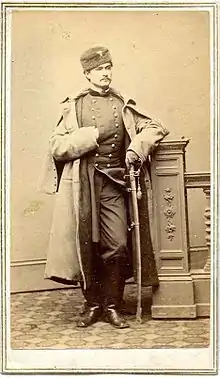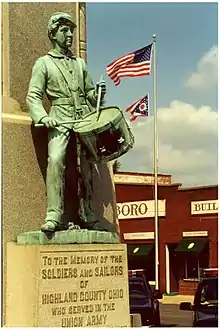Hubert Dilger
Hubert Anton Casimir Dilger (March 5, 1836 – May 4, 1911) was a German immigrant to the United States who became a decorated artillerist in the Union Army during the American Civil War. He was noted as one of the finest artillerists in the Army of the Potomac, receiving the Medal of Honor for his valiant work at the 1863 Battle of Chancellorsville.
Hubert Anton Casimir Dilger | |
|---|---|
 | |
| Born | March 5, 1836 Engen, Germany |
| Died | May 4, 1911 (aged 75) Front Royal, Virginia, U.S. |
| Place of burial | |
| Allegiance | United States of America Union |
| Service/ | United States Army Union Army Illinois National Guard |
| Years of service | 1861 – 1865 (Army), 1869 – 1873 (National Guard) |
| Rank | |
| Unit | |
| Commands held | Battery I, 1st Ohio Light Artillery |
| Battles/wars | American Civil War |
| Awards | Medal of Honor |
Early life and army career
Dilger was born in Engen in the Black Forest region in Germany and educated in the Karlsruhe Military Academy. He served as a lieutenant in the Grand Duke's Horse Artillery at military posts in Gottesau, Karlsruhe, and Rastatt. He developed several innovative theories on artillery tactics and drill. When news came of the outbreak of the American Civil War, Dilger received a leave of absence and sailed to the United States".[1]
_(14739885176).jpg.webp)
After relocating to Cincinnati, Ohio, he became the captain of Battery I, 1st Ohio Light Artillery and fought at several battles of the Army of the Potomac, including under fellow German native Maj. Gen. Carl Schurz at the Second Battle of Bull Run.
On May 2, 1863, Dilger fought in the rearguard of the retreating Union XI Corps during the disastrous Battle of Chancellorsville, for which he eventually was awarded the nation's highest decoration in 1893. He unlimbered his battery of six 12-pounder Napoleon smoothbore cannon as a last-ditch defense against a large portion of Stonewall Jackson's entire corps, which had pushed back XI Corps and was threatening to roll up the Union line.
Dilger also received high praise in the Official Records of the Battle of Gettysburg and for his work in the 1864 Atlanta Campaign during which his battery fired the rounds that killed Lt. General Leonidas Polk.[2] Late in the war, he was on garrison duty.
From 1869 to 1873 he was Adjutant-General for the State of Illinois.
After the war, Dilger prospered in Ohio and eventually purchased a sprawling horse farm in the Shenandoah Valley near Front Royal, Virginia, where he raised his family. After his death, a portion of his farm was purchased by the US Army as part of the creation of the Front Royal Remount Quartermaster Depot. His son Anton Dilger waged biological warfare for Germany against a still-neutral United States in World War I, infecting horses with anthrax and glanders. [3]
Hubert Dilger was the grandfather of General der Kavallerie Carl-Erik Koehler (3 December 1895 – 8 December 1958), Generalmajor Hubertus Lamey (30 October 1896 – 7 April 1981), both of whom served with the Wehrmacht, and Captain Carl Anton Keyser, USNR (18 January 1918 – 7 August 1995). Keyser served as a gunnery officer and later the executive officer aboard the USS Eberle (DD-430) during World War II.
Dilger is buried in Rock Creek Cemetery in Washington, D.C.[4]
Medal of Honor citation
The following citation was issued on August 17, 1893:
Fought his guns until the enemy were upon him, then with one gun hauled in the road by hand he formed the rear guard and kept the enemy at bay by the rapidity of his fire and was the last man in the retreat.[5]
See also
References
- Webpage for Dilger Archived 2011-06-08 at the Wayback Machine "DILGER WAS BORN MARCH 5, 1836 IN EUGEN, A BLACK FOREST TOWN. NAMED HUBERT ANTON CASIMIR DILGER, TAKING THE TWO MIDDLE NAMES FROM THE BOYS PATERNAL AND MATERNAL GRANDPARENTS"
- The Civil War: A Narrative Vol. 3 Red River to Appomattox by Shelby Foote
- David Woodbury (January 16, 2007). "Sometimes Heroes Sire Scoundrels (review of The Fourth Horseman by Robert Koenig)". obab.blogspot.com. Retrieved 2007-12-16.
- "Hubert Dilger". Claim to Fame: Medal of Honor recipients. Find a Grave. Retrieved 2008-07-02.
- "Citation of Dilger, Hubert". homeofheroes.com. Retrieved 2007-12-16.
